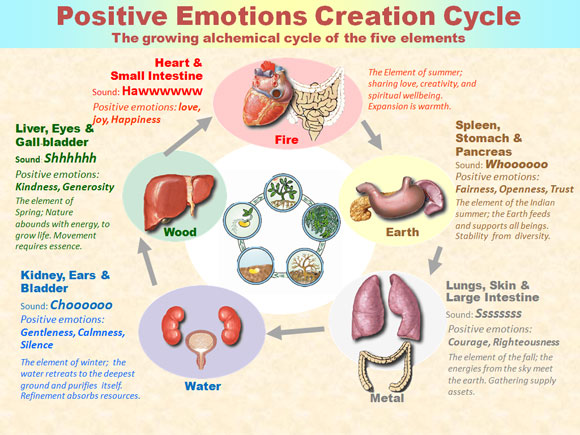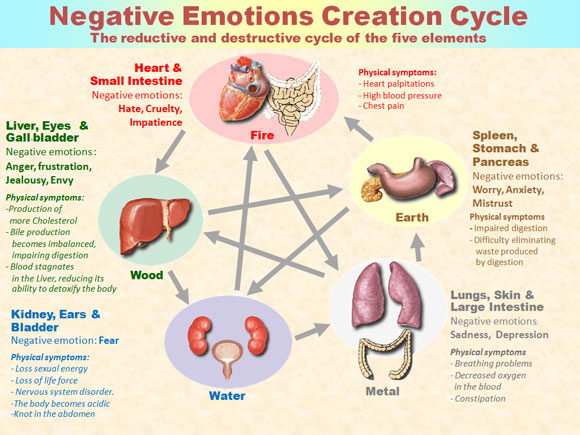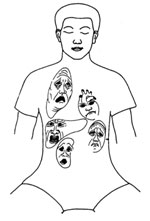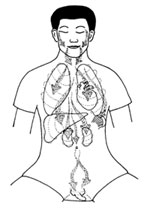We will be adding a new section under FREE Chi Kung Info about the Inner Smile and Six Healing Sound Practices.
As taught by Master Mantak Chia, Universal Tao Center, Thailand www.universal-tao.com
In the Taoist tradition, positive and negative emotions are associated with the internal organs. One of the keys to good health is to become aware of the emotional energies that reside in the organs, and to transform the negative emotional energies into positive virtues. Taoists believe that we are all born with the virtues of love, gentleness, kindness, respect, honesty, fairness, justice, and righteousness.

Figure 1. The positive virtues.
Unfortunately, as we mature and encounter more stress in our daily lives, negative emotions such as fear, anger, cruelty, impatience, worry, sadness, and grief often predominate. The negative emotions have deleterious effects on the internal organs and glands, draining our life-force and undermining our health.

Figure 2. The negative emotions are the body’s garbage.
In the Tao “emotional intelligence” is a process of recognizing emotions by their effects on the body, and employing exercises that transform the negative emotions into positive life force, or Chi. Two important exercises are the “Inner Smile” and the “Six Healing Sounds” techniques, as taught by Master Mantak Chia.

Figure 3. The negative emotions affect the body’s organ systems.
Taoists learned the relationships between emotional energies and organ systems over many centuries of study and meditation. They developed methods to transform negative to positive emotions from their practical and intuitive understanding of the human body. Many of the Taoist insights are supported by observations and evidence from modern psychology and medicine. The “Inner Smile” and “Six Healing Sounds” exercises focus on five organs or organ systems: the heart, the lungs, the kidneys, the liver/gall bladder, and the stomach/spleen.
- The heart is associated with the negative emotions of arrogance and hate and the positive virtues of kindness and love. Recent scientific research shows that feelings of love and appreciation strongly influence the heart’s rhythm and its relationship to the body’s physiological systems
- The lungs are associated with the negative emotions of sadness and depression, and the positive virtues of courage and righteousness. Emotional depression is often recognized by a physical depression and collapse of the chest and lungs.
- The kidneys are associated with the negative emotion of fear and the positive emotions of gentleness and kindness. Fear is closely related to the activity of the adrenal glands that lie on top of the kidneys. The adrenal glands secret adrenalin and noradrenalin when stimulated by the body’s fight-or-flight response.
- The liver is associated with the negative emotion of anger and the positive emotions of generosity and forgiveness. Physiologically, the liver is important for storing and rapidly releasing glucose into the blood. The energy of anger requires the rapid availability of metabolic energy stores in the body.
- The stomach/spleen are associated with the negative emotions of worry and anxiety and the positive emotions of fairness and openness. Most people will be familiar with the “butterflies” and “knots” in the stomach related to worry, apparently related to a network of network of neurons and neurotransmitters in the sheaths of tissue lining the digestive system, known as the enteric nervous system (Gershon, 1998).
The Inner Smile and Six Healing Sound exercises direct our attentions to the body’s organs and associated qualities. We successively visualize each organ, cleansing the organ and transforming negative emotional energies into positive virtues.

Figure 4. The Inner Smile
In the Taoist tradition, each person assumes responsibility for the emotions that arise within, regardless of the external events that trigger the emotions. Taoist exercises take us into our bodies and transform emotions by transforming the associated physiological systems. The Inner Smile and Six Healing Sounds exercises help balance and integrate our sympathetic and parasympathetic nervous systems, promoting health, resilience, and vitality.


No comments yet.